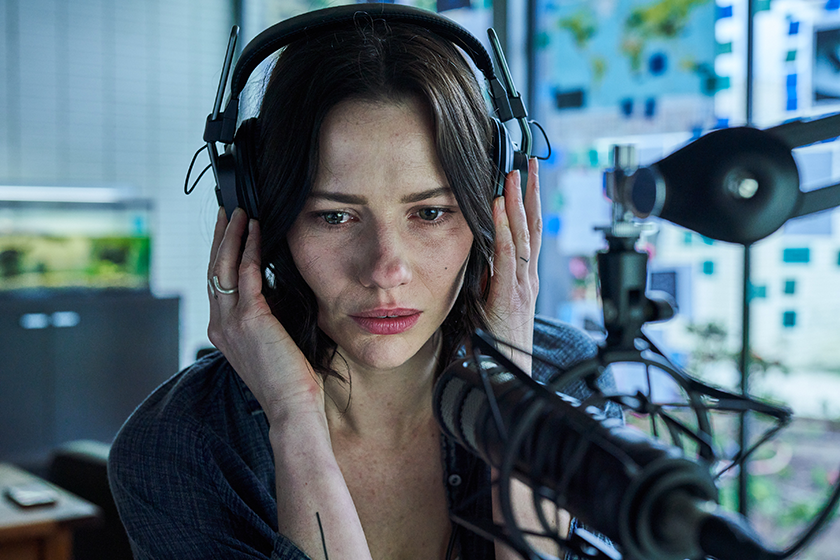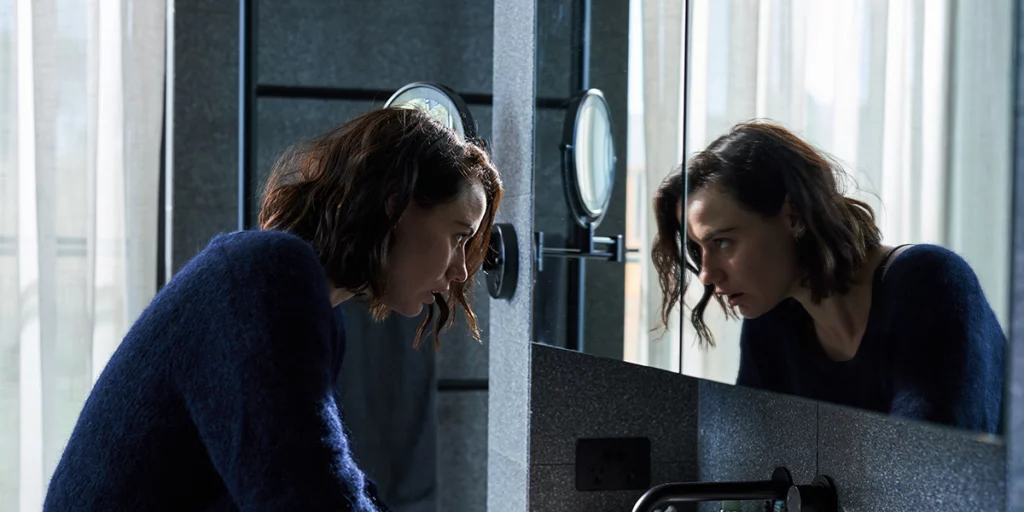Matt Vesely creates a restrained yet potent chamber-piece thriller with Monolith – a film carried by Lily Sullivan and excellent sound work.
The pandemic caused many filmmakers to experiment with the cinematic format, as they had to adhere to the on-set Covid protocols. Many films emerged out of the blue when directors were given the green light to make their films again. However, most of them didn’t leave an impression. In terms of the horror and thriller genres, there weren’t enough that you could actually be amazed by. But directors like Matt Vesely made something fascinating out of it, letting us know you can craft a potent thriller without the most considerable resources imaginable. With his feature-length debut Monolith, the Australian director creates an entertaining and tense thriller that uses its restrained nature to its best capabilities.
This chamber piece centers around an unnamed woman whom we only know as The Interviewer (Lily Sullivan). Once acclaimed and well-respected by her peers, she is now a disgraced journalist who hasn’t found a way to right her wrongs. Her established career was eradicated by a terrible “mistake” she made to seek more views. This interviewer now spends her days trying to salvage her career by any means possible. Hence, she hosts a podcast called “Beyond Believable”, where we hear odd ramblings about weird occurrences worldwide. She doesn’t treat her guests properly or set boundaries for her inquiries, resulting in plenty of people working in the industry putting her to the side. But there’s a story that might serve as her get-out-of-jail-free card. This story is about the strange appearance of a brick on the doorstep of a woman named Floramae King (voiced by Ling Cooper Tang).
The interviewer forcefully wants King to tell the entire tale, since she deems it interesting enough to hook listeners. And that is what moves you from one spot onto the next in that industry: having the most listers and backers. However, what she didn’t expect was that this story has many layers to it, and this leads her into a rabbit hole of alien conspiracies that makes her spiral into some kind of obsessive state as her podcast begins to strive. More people start to call in and tell their versions of the same random occurrence, yet these retellings get darker and more horrifying each time. Of course, the interviewer doesn’t mind, because it garners more listeners. But this feeling of unease comes with each story – the sensation transporting itself from the listener’s household to the interviewer’s.

Single-location thrillers are a tough ask for audiences. If the tension and mystery are not developed properly, you can quickly lose the viewer. I have seen plenty of these films throughout the past couple of years with interesting premises that failed to immerse the viewer because of this. Most of the scenes in Monolith center around the interviewer doing her podcast or researching this conspiracy. Lily Sullivan’s soothing voice and facial expressions guide us in this journey. As the film unfolds, things transition from intrigue to worry – and the final act to complete and utter horror. All of her reactions are acute definitions of what the scene and atmosphere entail. It is imposing how easily she has adapted to the horror/thriller genre and become an actress upon whom horror filmmakers can depend, like Vesely has done with Monolith.
While the sound work and atmosphere are two vital elements of Monolith’s thrills, the film relies on Sullivan’s performance. The Evil Dead Rise star does an excellent job of being the audience’s guide on this journey into the rabbit hole of alien conspiracy theories and mysterious objects – something bigger than herself. So, even if the film has a short runtime of ninety-four minutes, Vesely has quite a challenge on his hands if he wants to keep the audience hooked. However, he keeps you alert and engrossed in how it plays with the environment. First and foremost, this film is rooted in the protagonist’s cold, haunting surroundings and unwinding sounds.
The Australian filmmaker wants to catch the viewer by surprise as he uses the house’s corridors, dark corners, and spacious rooms to give the impression that something wicked this way comes. Cinematographer Michael Tessari often has the protagonist stand in the middle of the shot, leaving plenty of space around her to create more suspense and claustrophobia. On some occasions, the protagonist heads outside for a while to take a breather from the toll this is taking on her. But, for the most part, we are placed inside this household, slowly becoming haunted by some strange appearances. There isn’t a need for flashy or stylistic shots here; Tessari’s simplicity behind the camera makes each scenario feel grounded, even though the film has a sci-fi background within the story.
In addition to the claustrophobic cinematography, Vesely and the film’s sound team wanted to prioritize making this a sensory experience. While the movie relies on silence for most of its runtime, except for the back-and-forth dialogue in the interviewer’s podcast, there’s plenty of playfulness in how the sound team crafts the sounds and their respective timings. As the interviewer quotes: “All you have to do is listen”. In the second act, we notice that regular sounds like pens clicking or computer typings begin to have a different ring to them, being mistaken for otherworldly clatter. That’s one of the many ways in which Monolith catches you off-guard. That sense of uncertainty keeps the film from falling off like its contemporaries.
Monolith will be available to watch in theaters and on digital from February 16, 2024, from Well Go USA, and on digital platforms in the UK from February 26, from Blue Finch Film Releasing.

